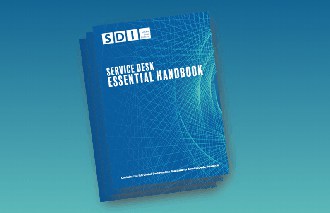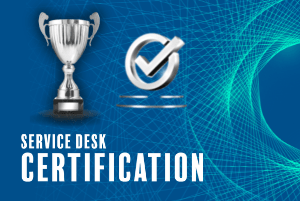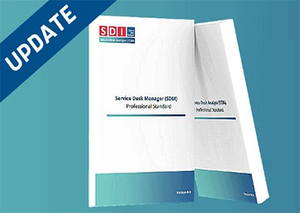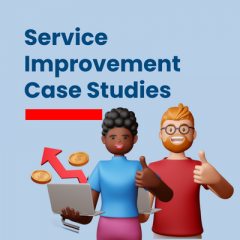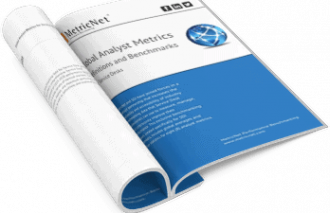eLearning Service Desk Analyst training
 Did you know that our prestigious SDA training is now available as a self-paced eLearning course?
Did you know that our prestigious SDA training is now available as a self-paced eLearning course?
Get qualified £499 + VAT (members get 10% discount!)
Benefits of eLearning
Flexibility – Studying can be done in short chunks of time that can fit around your daily schedule. You don’t have to dedicate an entire day to the training that has been organised by your company. Instead, you will have a set amount of learning, normally divided into modules, so you can work on those topics you want to focus on.
Mobile – As eLearning can be done on laptops, tablets and phones it is a very mobile method. Learning can be done on the train, on a plane or any other time that could normally be wasted. Whilst you used to be confined to the classroom, the whole world can now be your classroom.
No Travel– As just mentioned, eLearning can be done wherever you have a device capable of doing so. Therefore you can fit it in to your schedule, but also save money on the costs of travel. Public courses can sometimes only be sourced in locations far away from your company so you then have to pay the costs of travel as well as potentially accommodation. eLearning takes these costs away completely.
Lower cost – As you aren’t using a trainer’s time or any room or equipment, eLearning comes at a lower cost than classroom. Therefore if you and your company are on a tight budget, this can be the ideal option for you.
Tailored to you – eLearning courses aren’t fixed to suit the needs of the majority. If you feel you already know a particular area well and don’t need to spend an hour on it, you can skim over it and concentrate that time on something you feel you need to work on more. Everyone is able to learn at their own pace – a huge benefit that only self-guided eLearning can accommodate.
Global – With very few restrictions companies can be confident that their staff can receive the same content regardless of their location, and in many cases, their nationality. Therefore if you wish to provide the same training or have your staff understand and use common methodology, eLearning is a useful way of ensuring this happens with ease and reduced cost across geographical borders.
SDA Course Overview in brief:
This course contains 11 modules that are core to the role of a service desk analyst
-
- Roles and responsibilities – learn everything you need to know about being an efficient and effective service desk analyst and key concepts required to deliver support
-
- Relationship management – discover the importance of team work, customer relationships and cultural awareness, best practice customer service, dealing effectively with difficult situations and teamwork
-
- Effective communication skills and competencies – identify and develop the core competencies of communication required on the service desk
-
- Problem solving – examine the process and practice the techniques
-
- Effective rapport and conflict management skills – learn how to deal successfully with a variety of people and situations, including the difficult ones
-
- Effective processes management – establish the need for processes and procedures for call handling and how to create high-quality documentation
-
- IT Service Management – learn about the role of the service desk in the incident management process such as best practice procedures for escalations, problem, change and IT service continuity management, effective knowledge and service level management, IT security
-
- Quality assurance activities – review the importance of quality processes, customer satisfaction surveys and the benefits of metrics
-
- Tools and technologies – gain an insight in to the basics of PBX, ACD and IP telephony, CTI, self-service and self-healing technology
Learning outcomes
At the end of this course you will be able to:
- Explain the four key concepts that describe the required skills, competencies and knowledge for the service desk analyst
- Demonstrate the attributes, skills and knowledge required to fulfill the role effectively
- Recognise when to use those attributes, skills and knowledge to deal effectively with a variety of situations
- Explain how to better identify customers’ needs and motivations
- Recognise the benefits of teamwork
- Demonstrate the skills for handling difficult situations
- Recognise the need for effective and well thought out processes and procedures
- Describe the key IT service management processes in the areas where the service desk has clear responsibilities
- Recognise the importance and benefits of having service level agreements, operational level agreements and underpinning contracts in place
- Recognise the value and benefits of customer satisfaction surveys
- Identify the need for, and value of, metrics in the service desk environment
- Describe some of the available tools and technologies for service desk staff and customers to use
- Summarise how to effectively use social media tools in the service desk
More information about this course
Training Bytesize’s courses are accredited by PeopleCert.
Examination Information
The exam lasts for 1 Hour and consists of 60 computer-based, multiple-choice questions designed to test your knowledge and understanding of the official SDI standards.
Why study this course with training bytesize?
Bytesize have been in the Project Management training space for over 20 years and strives for the highest quality learning experience teamed with outstanding customer service. As a leading provider of project management training, bytesize are a company that equips you with the skills to confidently manage your projects using cutting edge technology combined with an effective learning platform for individuals and groups alike.
